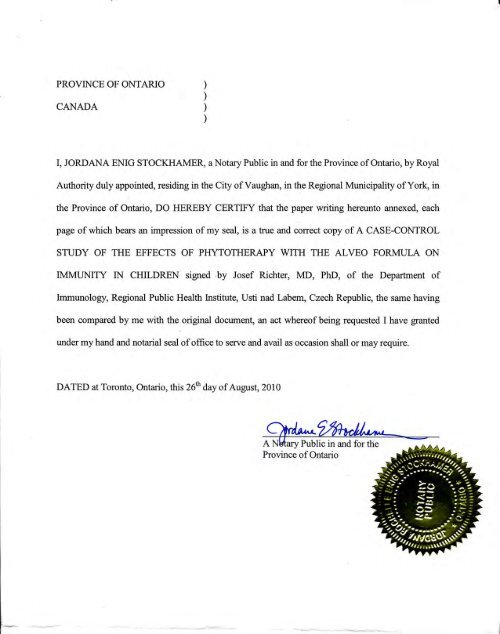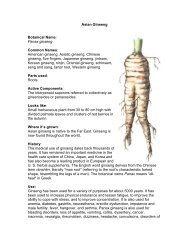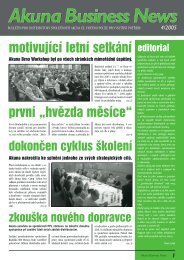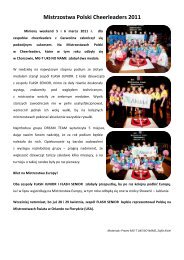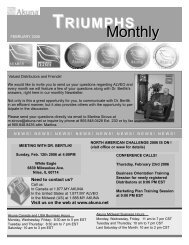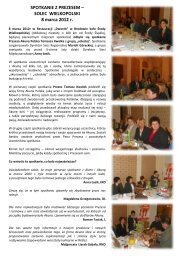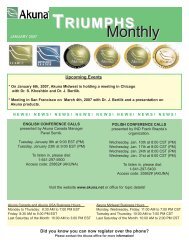You also want an ePaper? Increase the reach of your titles
YUMPU automatically turns print PDFs into web optimized ePapers that Google loves.
PROVINCE OF ONTARIO<br />
CANADA<br />
)<br />
)<br />
)<br />
)<br />
I, JORDANA ENIG STOCKHAMER, a Notary Public in and for the Province <strong>of</strong> Ontario, <strong>by</strong> Royal<br />
Authority duly appointed, residing in the City <strong>of</strong> Vaughan, in the Regional Municipality <strong>of</strong> York, in<br />
the Province <strong>of</strong> Ontario, DO HEREBY CERTIFY that the paper writing hereunto annexed, each<br />
page <strong>of</strong> which bears an impression <strong>of</strong> my seal, is a true and correct copy <strong>of</strong> A CASE-CONTROL<br />
STUDY OF THE EFFECTS OF PHYTOTHERAPY WITH THE ALVEO FORMULA ON<br />
IMMTINITY IN CHILDREN signed <strong>by</strong> Josef Richter, <strong>MD</strong>, PhD, <strong>of</strong> the Department <strong>of</strong><br />
Immunology, Regional Public Health Institute, Usti nad Labem, Czech Republic, the same having<br />
been compared <strong>by</strong> me with the.original document, an act where<strong>of</strong> being requested I have granted<br />
under my hand and notarial seal <strong>of</strong> <strong>of</strong>fice to serve and avail as occasion shall or may require.<br />
DATED at Toronto, Ontario, this 26tr day <strong>of</strong> August, 2010<br />
Public in and for the<br />
Province <strong>of</strong> Ontario
an health se1ices, treatment and health procedures worldwide are provided <strong>by</strong> the practices<br />
<strong>of</strong> CAM (2).<br />
The public's growing interest in botanical formulas is notable. There has been a wide<br />
application <strong>of</strong> phytotherapy in the past decade (9, 10, 13, 15, 18, 19, 27'and 29). The general<br />
public is becoming more concerned with the use <strong>of</strong> various herbal formulas, herbal extracts<br />
and mixtures. Many clinical case studies based on a wide scale <strong>of</strong> herbal products have<br />
already been published (1, 2,7,8, and l9).<br />
This is what inspired us to conduct a study on the effects <strong>of</strong> the botanical formulation<br />
ALVEO. We were mostly interested in the response <strong>of</strong> clinical changes and the changes in<br />
seeretory immunity after the administration <strong>of</strong> Alveo. After studying its individual<br />
components we suspected the possibility <strong>of</strong> positive effects. To observe its impact we selected<br />
two groups <strong>of</strong> children: one group consisted <strong>of</strong> children being treated at our clinic for chronic<br />
upper respiratory tract infections and the other was a control group <strong>of</strong> healthy children'<br />
ALVEO is a botanical tonic manufactured <strong>by</strong> <strong>Akuna</strong> Health Products Inc. in Canada-<br />
It was used in the recommended dose <strong>of</strong> 28 ml per day. The study was conducted between<br />
September 2006 and September 2007. Following are the partial results <strong>of</strong> this study.<br />
Study methodolory:<br />
The case group (Group A) consiste d <strong>of</strong> 27 children ( 14 boys and I 3 girls) undergoing longterm<br />
treatment at the Department <strong>of</strong> Microbiology and Immunology; the control group (Group<br />
B) consisted <strong>of</strong> 35 children (18 boys and 17 girls) from an elementary school in Usti nad<br />
Labem, Czech Republic. The children in Group A were between the ages <strong>of</strong> 6 and 13 with the<br />
average age being 10.95 years; the children in Group B were between the ages <strong>of</strong> 9 and 14<br />
with the average age being 10.74 years. Group A was given I ounce or 28 ml <strong>of</strong> ALVEO<br />
daily on an empty stomach or half an hour after a meal. Every child consumed I bottle <strong>of</strong><br />
product in Bn average <strong>of</strong> 35 days. The children in Group B received a placebo which<br />
resembled Alveo in appearance and contained the same amount (950 ml) <strong>of</strong> liquid but no<br />
active ingredients. The length <strong>of</strong> application was averaged 34 days.
The clinical disposition <strong>of</strong> each child was recorded on a daily basis using a<br />
questionnaire with an emphasis on the symptomatology <strong>of</strong> infections mainly <strong>of</strong> the upper<br />
respiratory tract (cough, phlegm discharge, temperature, rhinitis, pharyngitis, and otitis).<br />
Collected data was processed and duration <strong>of</strong> illness observed. Anthropometric measurements<br />
were taken for each child and hiVher BMI was calculated'<br />
At the same time, the saliva <strong>of</strong> each child was collected prior to and after application<br />
using the standard method <strong>of</strong> gathering unstimulated saliva. These specimens were stored in<br />
standard plastic test tubes at less than 70 o C until processing. The exact time <strong>of</strong> collection<br />
was observed when the effects <strong>of</strong> circadian rhythmicity were not present (24). The levels <strong>of</strong><br />
albumin and IgA in the saliva were determined <strong>by</strong> immunonephelometry using the Behring<br />
and the Dade Behring BN II antisera. The obtained results were grouped according to the<br />
following levels: Albumin at 50rng/L <strong>of</strong> saliva being the norm; 100mg/L being a sign <strong>of</strong><br />
irritation; 500 mg/L a sign <strong>of</strong> infection; and amounts greater than 500 mg/L signiffing an<br />
infection in progress. As for the IgA, normal amounts range between 20 and 150 mgll <strong>of</strong><br />
saliva.<br />
The ratio <strong>of</strong> IgA to albumin was then calculated at all levelsin relation to the<br />
individual groups observed. The preference <strong>of</strong> this index being a reduction in the amount <strong>of</strong><br />
lgA transferred into the saliva as a result <strong>of</strong> infection.<br />
Data analysis:<br />
Differences in findings for the individual groups observed were compared for each <strong>of</strong> the<br />
groups before and after the application <strong>of</strong> Alveo and later also in interrelation to the placebo<br />
groups and the control files. The average values <strong>of</strong> the findings were calculated as well as the<br />
absolute values and later also the logarithmic values <strong>of</strong> the mean-root-square errors at95% Cl<br />
<strong>by</strong> means <strong>of</strong> statistical s<strong>of</strong>tware such as Micros<strong>of</strong>t Excel,Instat 3 and Prism 4 (USA). The<br />
differences were then evaluated using the Smirnov-Kolmogorov test, the t-test, the A}'{OVA<br />
test, the Tukey-Kramer test.<br />
Ethics:
This case study was conducted in accordance to the Declaration <strong>of</strong> Helsinki (Fourth revision<br />
1996) and the guidelines for clinical testing in the Czech Republic. Permission was obtained<br />
prior to the start <strong>of</strong> the study from all the parents <strong>of</strong> the children tested with the formula.<br />
Results:<br />
Table I contains the findings before and after the application <strong>of</strong> the formula and the placebo<br />
over the course <strong>of</strong> 4 weeks (equal to the consumption <strong>of</strong> one bottle <strong>of</strong> product). The<br />
comparison in the amounts <strong>of</strong> IgA and albumin in the saliva <strong>of</strong> the placebo controlled group<br />
did not show any significant changes before or after application. On the contrary, the children<br />
who were given the ALVEO formulation and who suffered from chronic upper respiratory<br />
tract infections showed statistically a highly significant decrease in the amount <strong>of</strong> IgA and<br />
albumin alike.<br />
In studying the occumences in clinical evidence, we discovered that the clinical<br />
symptoms in children who consumed the ALVEO formula decreased <strong>by</strong> almost two thirds.<br />
Discussion:<br />
Even in the more advanced countries there are both historical and cultural reasons for the use<br />
and application <strong>of</strong> alternative medicine rather than conventional treatments. It is important to<br />
acknowledge that for half the world's population this type <strong>of</strong> treatment is actually the norm.<br />
The use <strong>of</strong> the term "supplementary"- alternative medicine (complementary - altemative -<br />
medicine - CAM) stems form the close relationship between the classical and alternative<br />
approaches to treatment. This can include altemative physical procedures such as acupuncture<br />
and acupressure as well as the application <strong>of</strong> herbal remedies as practiced <strong>by</strong> Indian, Japanese<br />
and Chinese cultures and in procedures such as phytotherapy and so on (19,29).<br />
An example would be in the treatment <strong>of</strong> allergies where a blend <strong>of</strong> various botanicals<br />
was used. The formulation Pollen contains a mixture <strong>of</strong> 12 different pollens. The reported<br />
effect <strong>of</strong> this product was a decrease in the frequency <strong>of</strong> allergy symptoms and a lower intake<br />
<strong>of</strong> antibiotics (2). The use <strong>of</strong> various herbal homeopathic formulas was observed in a series <strong>of</strong><br />
clinical trials in individuals suffering from allergies, asthma, bronchitis as well as other health<br />
conditions (7, 8, 10, 13, 15, lg,zg,and 30). Althoughthe discussion about the positive effecs
<strong>of</strong> homeopathic products on the market remains intense, it is necessary to take a truly<br />
qualifred stance on the matter; the evidence for which can only be provided <strong>by</strong> scientific and<br />
complex studies (1, 2, and l2). Presently there are no trial results that completely negate the<br />
effects <strong>of</strong> phytotherapeutic products; nor are there any results that entirely support them (2).<br />
We discovered that from the total 26 ingredients contained in the tested formula, at least 16<br />
have an effect on the modulation <strong>of</strong> immunity response while others seem to function via<br />
modulation <strong>of</strong> CNS (10, 30). In present day USA, herbal extracts and the formulas containing<br />
herbal extmcts are considered to be medicines, food and even dietary supplements. The latter<br />
are commonly refened to as DSHEA (4). Some herbal products are considered to be<br />
adaptogens - products which have a normalizing (restorative) influence on the body and help<br />
defend it against stressors (4, 10). We still require more research about the antioxidant<br />
tendencies <strong>of</strong> herbal extracts, their effects on the regulation <strong>of</strong> enzymatic functions and their<br />
precise influence on the entire immune system (1, 7, and 8). In our observations at the Health<br />
Institute we have noticed that herbal extracts have positive effects on the health <strong>of</strong> children<br />
who are already successfully responding to treatment. But even with some <strong>of</strong> our patients, we<br />
realize that short-term application <strong>of</strong> these herbs (over the course <strong>of</strong> one month) is not enough<br />
to positively influence the observed immunity parameters.<br />
The safety <strong>of</strong> herbal formulations depends on their.orrrportdon; though the fact<br />
rcmains that the effects <strong>of</strong> many herbal extracts are still not known. For example, there are<br />
more than 100 different components in tea tree oil alone (29).<br />
Preference should be given to those products, which have undergone a series <strong>of</strong><br />
laboratory and clinical tests, and most importantly, which have been approved <strong>by</strong> the<br />
appropriate bodies in the respective country. Many widely available folk remedies may<br />
actually turn out to be potentially harmful, Therefore, it is important to always notify the<br />
public about the possible side-effects and risks involved with taking any particular formula<br />
(29). Chamomile can for example trigger an allergic reaction in individuals who have been<br />
sensibilized <strong>by</strong> the allergens <strong>of</strong> ragweed or chrysanthemum (29). Other herbs such as Garden<br />
angelica and rue can highly increase one's photosensitivity.<br />
Herbs and herbal products demonstrate significant antimicrobial activity. This activity<br />
is mainly influenced <strong>by</strong> the phenolic and polyphenolic substances, which also act as strong<br />
antiviral, antibacteiial and antifungalagents (7, l3); Terperroids also dernonstrde
antibacterial, antifungal, antiviral and protozoaic activity. Similarly it is with alkaloids,<br />
lectins, polypeptides and other substances (7, 13, and l8). Some ingredients in ALVEO such<br />
as licorice are important besause they induce interferon activity, increase the activity <strong>of</strong><br />
natural killer (or NK) cells and display antiviral activity including against HIV. Glyconhizin<br />
has anti-inflanrmatory and anti-allergic properties (7, 8, 15, andlS). Some ingredients<br />
contained in the formulation not only demonstrate significant antimicrobial activity but they<br />
also have the ability to modulate the immune system. These traits have been confirmed in a<br />
series <strong>of</strong> clinical trials, mainly in individuals inflicted with respiratory illnesses (2' 20).<br />
Additional benefits <strong>of</strong> the formula are many. There is evidence <strong>of</strong> favorable impact on skin<br />
infections, immune dysfunctions, and fatigue syndrome (29). The use <strong>of</strong> the formula as a<br />
preventative stems from, not only its effects on the modulation <strong>of</strong> the immune system, but<br />
also from its effects against stress and fatigue as well as many its other benefits (21,22).<br />
In addition to observing the clinical behaviors or reactions <strong>of</strong> an individual to an<br />
ALVEO regime, we also decided to measure the parameters <strong>of</strong> salivary immunity and IgA,<br />
from which we further calculated the ration <strong>of</strong> Albumin to IgA. The reason for this was to<br />
check if our results were corrdct. We evaluated the diagnoses <strong>of</strong> the children prior to the study<br />
and after its completion. The collection <strong>of</strong> saliva was carried out id a standard manner and<br />
always at the same time <strong>of</strong> day (23,25). There is little possibility <strong>of</strong> comparing the<br />
immunological findings after the phytotherapy with those <strong>of</strong> other studies because <strong>of</strong> the lack<br />
<strong>of</strong> literature available on this subject. Only isolated studies study the effects <strong>of</strong> ginseng on the<br />
levels <strong>of</strong> IgA (9, 11). The measuring <strong>of</strong> IgA in saliva alone is fairly inaccurate because it is<br />
way too easily affected <strong>by</strong> the presence <strong>of</strong> inflammation or damage to the mucous lining <strong>of</strong><br />
the oral cavity. This is why we decided to also measure the amounts <strong>of</strong> albumin in the saliva.<br />
The presence <strong>of</strong> which signifies the presence <strong>of</strong> an inflammation, irritation or infection (3, 16,<br />
17,20,23,25,28). We also cannot omit the effects <strong>of</strong> tonsillectomy on the amounts <strong>of</strong> both<br />
observed components. as in our study on body fat (5, l2). Circadian and seasonal rhythmicity<br />
can also significantly influence the findings <strong>of</strong> certain proteins in saliva (25). This is why it is<br />
so important to strictly adhere to a collection schedule. The influence <strong>of</strong> physical strain on<br />
salivary immunity is also worth a mention (5).<br />
In closing, we can state that we observed the benefits <strong>of</strong> regular application <strong>of</strong> the<br />
ALVEO formulation in children. The conclusions we reached suggest a limitation caused <strong>by</strong><br />
tbe short application p€riod We believe tbat a oourse <strong>of</strong> snrdy over the period <strong>of</strong> three montbs
would be optimal. Furthermore, new studies show that the inclusion <strong>of</strong> new indicators in<br />
saliva would be appropriate for the purpose <strong>of</strong> nutritional immunology (l l).<br />
Literature:<br />
l. Bellavite, P., Ortolani, R., Pontarollo, F,, Piasere, V., Benato, G., Conforti, A.:<br />
Immunology and Homeopaty. 4. Clinical Studies-Part 1. eCAM, 3,2006,s.293-301.<br />
2. Bellavite, P., Ortolani, R., Pontarollo, F., Piasere, V., Benato, G., Conforti, A.:<br />
Immunology and Horneopaty.4.Clinical Studies-Part 2. eCAM,3,2006,s.397-409.<br />
3. Brown, L.R.. Frome, W.J., Wheatcr<strong>of</strong>t, M.G., Riggan, L.J., Bussell, N.E., Johnston, D'A':<br />
The Effect <strong>of</strong> Skylab on the Chemical Composition <strong>of</strong> Saliva. J.Dent.Res. 56,1977,<br />
s.l 137-l 143.<br />
4. Bucci, L.R.: Selected herbals and human exercise performance. Am.J. clin. Nutr.,<br />
72,200A, s.624s-636s.<br />
S. Cieslak. TJ.,Frost,G., Klentrou P.: Effects <strong>of</strong> physical aktivity, body fat, and salivary<br />
cortisol on mucosal immunity in children., J. Appl. Physiol., 95,2003, s. 2315 -2320'<br />
6. Childers, N.K., Powel, W.D., Tong, G., Kirk, K., Wiatrak,8., Michalek, S.M.: Human<br />
salivary immunoglobulin and antigen-specific antibody activity after tonsillectomy.,Oral<br />
Microbiol. Immunol., 16,2001, s. 265 -269.<br />
7. Cowan,M.M.: Plant Products as Antimicrobial Agents, Clin.mikrobiol. Rev.,12,1999,<br />
s.546 - 582.<br />
8. Craig, W.J.: Health-promoting properties <strong>of</strong> common herbs. Am. J. Clin. Nutr., 70, 1999,<br />
s.491-499.<br />
9. Engels, H.J., Fahlman, M.M., Wirth, J.C.: Effects <strong>of</strong> ginseng on secretory IgA'<br />
performance, and recovery from interval exercise. Med.Sci Sports Exerc.,35,2003, s.690-<br />
696,.<br />
10. Emst, E.,: The Risk - Benefit Pr<strong>of</strong>ile <strong>of</strong> Commonly Used Herbal Therapies: Ginkgo, St.<br />
John's Wort, Ginseng, Echinacea" Saw Palmetto, and Kava., Arur. Intem. Med., 136,<br />
L<br />
t_<br />
I<br />
2002, s. 42 - 53.<br />
I l. Feig, S.A., Speigbt, N., Hynete,E.,Magaziner, A.: Summary <strong>of</strong> American College for<br />
Advancement in Medicine November 2004 Conference on Emerging Concepts in<br />
Immunology. eCAM, 2.2005, s. l2l -124.<br />
12. Gidden, F., Shenkin. A.: Laboratory support <strong>of</strong> the Clinical Nutrition Service.<br />
Clin.Chem.Lab.Med. 38; 2000,s -693-'7 L 4.
13. Glatthaar-saalmuller,8., Sacher, F., Esperester, A': Antiviral Activity <strong>of</strong> an extract<br />
derived from roots <strong>of</strong> Eleutherococcus senticosus. Antiviral Res., 50,2001, s.223'228' ,<br />
14. Gleeson, M., Pyne, D.B.: Exercise effects on mucosal imunity. Immunol'Cell Biol', 78,<br />
2000, s.536-544.<br />
15. Haddad, P.S., ArAt,G.A., Groom, S., Bolvin, M.: Natural Health Products, Modulation <strong>of</strong><br />
Immune Function and Prevention <strong>of</strong> Chronic Disease. eCAM,2'2005,s.513-520'<br />
16. Kaufman, E, Lamster, I.B.: The Diagnostic Application <strong>of</strong> Saliva - a review'<br />
Crit.Rev.Oral.Biol.Med."<br />
1 3,2002, s.197'212'<br />
17. Kugler, J., Hess, M., Haake, D.: Secretion <strong>of</strong> salivary immunoglobulin A in relation <strong>of</strong><br />
age, salivary flow" mood state, secretion <strong>of</strong> albumin, cortisol' and catecholamines in<br />
saliva., J.clin.Immunol., 12,1992,s. I 573'<br />
18. O'Hara,M., Kiefer, D., Farrel,K, Kemper, K.: A review <strong>of</strong> l2 Commonly Used medicinal<br />
Herbs. Arch.Fam.Med., 7,1998,s.523-536'<br />
19. Passalacqua" G., BOuqUet, P.J.. Carlsen, K.H., Kemp, J., LoCkey, R.F., Niggemann' B"<br />
Pawankar,R., Price, D., Bouquet, J.: ARIA update: I-Systematic review <strong>of</strong> complementary<br />
and alternative medicine for rhinitis and asthma. J.Allergy Clin.Immunol', 117, 2006'<br />
s.1054-1062.<br />
20. Pilette. C., Quadrhiri. Y., Godding, V., Vaerman,J'-P', Sibille, Y': Lung mucosal imunity:<br />
immunoglobulin - A revised., Eur.Respir.J., I 8.2001,s.571 -588.<br />
21. Predy, G.N., Goel,V., Lovlin, R., Donner, A., stitt, L., Basu, T.K.: Efficasy <strong>of</strong> an extract<br />
<strong>of</strong> North American ginseng containing poly-furasonyl-saccharides for preventing upper<br />
respiratory tract infections: a randomised conrolled trial. CMAJ ,173,2005, s.1043-1048.<br />
22. Reid, V.I., Gleeson, M., Williams, N., Clancy, R.I.: Clinical investigation <strong>of</strong> athlets with<br />
persistent fatigue and/or recurrent infections. Br.J.Sports Med.' 38, 2004, s-42'45'<br />
23. Richter, J., Pelech. L.: Immunological findings in groups <strong>of</strong> children after compensatory<br />
measures. Toxicology Letters. 88, 1996, s'165-168'<br />
24. Richter, J., Kr6l, V., zukov, I., subn, P., Rahm, J.: circadian changes <strong>of</strong> the SIgA,<br />
lysozyme, albumin and copper kontent in SAliva., Czechol'Med', 3,1980<br />
' s'249-254'<br />
25. Riedler,J., H<strong>of</strong>stotter, H., Huttengger,I., Golser, A-: Secretory immunoglobulin A in<br />
childhood: does the saliva value reflects the bronchial value?, Klin.Padiatr.,205,<br />
1993,s.92-98.;<br />
26. Rytschkova, M.A., Tuev, A.V., Krasnoshtejn, A:8., Airapetova" N'S', Verichova, L'A', et<br />
al.: Treatrrent in speleoclimatic chamber made from potassium-magnesium salts <strong>of</strong>
7<br />
verchnekamskoye deposit. Recomanded methods. Moscow-1994...., Health and Medical<br />
industry ministry <strong>of</strong> Russian Federation,1994.<br />
27. Schaad, U.8., Mutterlein, R., G<strong>of</strong>frn, H.: lmmunostimulation With OM-85 in Children<br />
With Recurrent Infections <strong>of</strong> the Upper Respiritory Tract: A Double-Blind, Placebo-<br />
Controlled Multicenter Study. Chest, 122, 2002, s.2042-2049.<br />
28. Schenkels, L., Veerman, 8., Nieuv Amerongen" A.V.: Biochemical Composition <strong>of</strong><br />
Human Saliva in Relation to Other Mucosal Fluids. Crit.Rev.Oral Biol.Med.,6, 1995,<br />
s.1 67- 1 75.<br />
29. Wilson, K., Busseo J.W.. Gilchrist, A., Vohr4 S., Boon, H., Mills, E.: Chracteristic <strong>of</strong><br />
Pediatric and Adolescent Patients Attending a Naturopathic College Clinic in Canada.<br />
Pediatrics, I15, 2005. s.338-343.<br />
30. Woolf, A.D.: Herbal Remedies and Children: Do They Work? Are They Harmful?<br />
Pediatrics, I12. 2003, s.240-246.<br />
Appendix:<br />
Albumin in saliva <strong>of</strong> children before (1) and after (2)<br />
application <strong>of</strong> Alveo and placebo<br />
140<br />
o 130<br />
E tzo<br />
@<br />
5 110<br />
E 100<br />
E90<br />
c<br />
E80<br />
Ero
-\<br />
i SlgA in saliva <strong>of</strong> children befor€ (1) and afier (2)<br />
I application <strong>of</strong> Alveo and placebo<br />
i<br />
o<br />
25t)<br />
fr zoo<br />
o<br />
b rso<br />
CD<br />
E roo<br />
8so<br />
0<br />
i SlgAl I SlgA2 , SlgAl SlgA2<br />
Controlgrdp<br />
Case grouP<br />
it<br />
Josef Richter, <strong>MD</strong>, PhD, \Dpt <strong>of</strong> Immunology, Regional Public Helth Instute, Usti nad<br />
Labem, Czech republic.<br />
Josef.richter@ zuusti.cz<br />
(W fi'"'e-L{'u'


